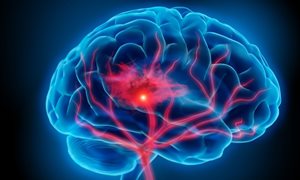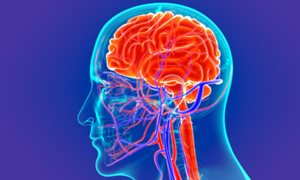
Have you seen the movie “The Father”? In this excellent film, we follow the heartbreaking story of a man, played by Anthony Hopkins, that loses grip on his life and reality due to dementia. Anthony won an Oscar deservedly for his role. Alzheimer’s disease (AD) is the leading cause of dementia worldwide. The clinical diagnosis is based on a gradual decline of cognition, most commonly with an impairment in encoding and recall of recently learned information. Cerebrospinal fluid and neuroimaging biomarkers can be used to support diagnoses, and may contribute to predicting the disease progression and treatment response.
The current authors set out to research a new biomarker in cerebrospinal fluid called “neuroleukin”. In an earlier study, they found that this protein was expressed in a pathological hallmark of AD: “amyloid plaques”, and also in small blood vessels that had amyloid accumulation. The latter phenomenon is described by the term “cerebral amyloid angiopathy” (CAA). CAA damages the small blood vessels in the brain, which leads to cognitive decline and brain hemorrhages. 50% of the AD patients also have CAA.
The research group, led by Marcel Verbeek, from the translational metabolic lab and the department of neurology, in collaboration with the department of neurology from the University of Barcelona, published the results of this study in “Alzheimer Research and Therapy” on the 21th of September 2021. They found that cerebrospinal fluid neuroleukin was increased both in mild cognitive impairment (a prodromal stage of AD) and in AD, but not in CAA. They also found that neuroleukin may play a role in the chronic inflammation that is found in AD. The researchers conclude that neuroleukin is a marker associated with early stage AD, and that it is possibly involved in a neuroprotective response to neuronal damage caused by AD pathology.
Publication
Related news items

Milk fat to attenuate obesity-related neurological co-morbidities
18 November 2021 The use of lipids to attenuate co-morbidities of obesity may sound paradoxical. However, it has shown to be particularly relevant in the fight against a less familiar co-morbidity of obesity, as it can induce alterations in white matter tracks, neuroinflammation and increases the risk of dementia. go to page
Palliative care for people with Parkinson’s Disease and their family Caregivers Current state of affairs
7 October 2021 Advanced stage Parkinson’s disease can cause a variety of symptoms, for which palliative care can be beneficial, though research from the point of view of patients in later stages is still rare. Radboudumc researchers therefore placed their patients perspectives at the center of their recent study. go to page
Radboudumc to lead research team into tackling future pandemics NWO funds complexity research on pandemics
5 August 2021 The Radboudumc is going to lead a study on how to deal with future pandemics, together with Radboud University and the University of Amsterdam. Rick Quax from the Informatics Institute/IAS is involved in this project. go to page
Treatment of brain diseases at risk if neuroscientists can no longer conduct their research
5 August 2021 In order to treat brain diseases such as depression, Alzheimer's or ADHD, more research into the brain is needed. go to page

